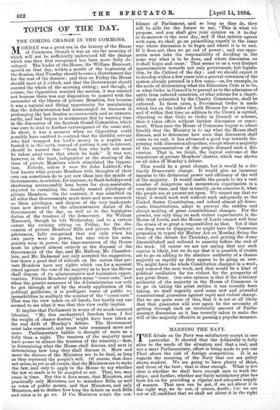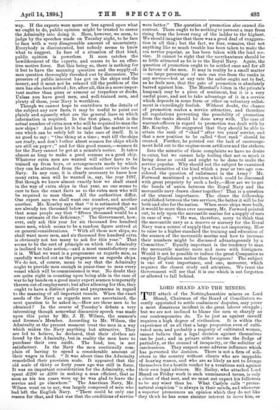MANNING THE NAVY. T HE debate on the Navy was satisfactory
except in one particular. It showed that the Admiralty is fully alive to the needs of the situation, and that a real, and not a mere Parliamentary, effort is being made to put our Fleet above the risk of foreign competition. It is as regards the manning of the Navy that our sea policy shows weakest. We are going to have plenty of ships,. and those of the best ; that is clear enough. What is not clear is whether we shall have enough men to work the ships ; and further, whether any fairly satisfactory plan has been hit on for providing a regular and adequate supply of seamen. That men can be got, if we set about it in the right way, we do not, of course, doubt ; Lut we are not at all confident that we shall set about it in the right. way. If the experts were more or less agreed upon what we ought to do, public opinion might be trusted to coerce the Admiralty into doing it. Here, however, we seem, to judge by the speeches made on Tuesday night, to be face to face with a very disagreeable amount of uncertainty. Everybody is discontented, but nobody seems to know what to suggest. In face of a situation of that kind, public opinion is powerless. It soon catches the bewilderment of the experts, and ceases to be an effec- tive motive force. But this being so, there is nothing for it but to have the manning question and the supply-of- men question thoroughly threshed out by discussion. The pressure of public interest has got us the ships and the money, and it must not be relaxed till the problem of the men has also been solved ; for, after all, this is a more impor- tant matter than guns or armour or torpedoes or docks. Unless you have good men, and well-trained men, and plenty of them, your Navy is worthless. Though we cannot hope to contribute to the details of the subject any new facts, it may be useful to point out plainly and squarely what are the general lines on which information is required. In the first place, what is the actual number of extra men who will be required to man the new ships i And here let it be said that the matter is not one which can be safely left to take care of itself. It is no good to say : " One thing at a time ; wait till the ships are ready, and don't I-other about seamen for ships which are still on paper ; " and for this good reason,—seamen fit for the Navy cannot be got at a minute's notice. It takes almost as long to make a good seaman as a good ship. Whatever extra men are wanted will either have to be trained up from boys, or arrangements made by which they can be attracted from the merchant service into the Navy. In any case, it is clearly necessary to know how many extra men will be wanted in, say, the year 1897. But though we know almost exactly how we shall stand in the way of extra ships in that year, no one seems to care to face the exact facts as to the extra men who will be required to man them. All the authorities differ. One expert says we shall want one number, and another another. Mr. Kearley says that " it is estimated that we are already ten thousand below our proper strength," and that some people say that " fifteen thousand would be a truer estimate of the deficiency." The Government, how- ever, only ask this year for six thousand five hundred more men, which seems to be a random figure arrived at on general considerations. " With all these new ships, we shall want more men, and six thousand five hundred extra is obviously not too many to ask for this year." That seems to be the sort of principle on which the Admiralty is inclined to take action,—and a most unsatisfactory one it is. What we want is a programme as regards men, as carefully worked out as the programme as regards ships. We do not, of course, mean to say that the Admiralty ought to provide men enough in peace-time to man every vessel which will be commissioned in war. No doubt they are quite right in counting upon being able in the case of war to lay hands on a good many expert seamen temporarily thrown out of employment; but after allowing for this, they ought to have a distinct policy and programme in regard to the manning of all important vessels. When the exact needs of the Navy as regards men are ascertained, the next question to be asked is,—How are these men to be obtained ? In the course of Tuesday's debate a very interesting though somewhat discursive speech was made upon this point by Mr. J. H. Wilson, the seamen's and firemen's Member. According to Mr. Wilson, the Admiralty at the present moment treat the men in a way which makes the Navy anything but attractive. They are led to believe, he declared, that their clothes are found by the Admiralty, but in reality the men have to purchase their own outfit. The food, too, is not satisfactory. In the Navy the men continually com- plain of having to spend a. considerable amount of their wages in food. " It was about time the Admiralty remodelled their provision scale. It appeared that the old scale of thirty or forty years ago was still in force. It was an important consideration for the Admiralty, who spent £200 or £300 in making a man efficient, that as soon as his ten years were up he was glad to leave the service and go elsewhere." The American Navy, Mr. Wilson went on to say, was largely composed of men who had left the English Navy. " There could be only one reason for that, and that was that the conditions of service were better." The question of promotion also caused dis- content. There ought to be nothing to prevent a man from rising from the lowest rung of the ladder to the highest. We should imagine that there was a good deal of exaggera- tion in all this ; but the fact, we fear, remains, that not anything like so much trouble has been taken to make the sea service popular, as has been taken with the land ser- vice. It cannot be right that the merchantman should be so little attracted as he is to the Royal Navy. Again, the question of promotion ought to be settled once and for all in favour of the men. It may in reality be a small matter —no large percentage of men can rise from the ranks in any service—but at any rate the sailor ought not to feel, as he feels now, that the gate of promotion is absolutely barred against him. The Marshal's bliton in the private's knapsack may be a piece of sentiment, but it is a very useful piece, and not to take advantage of it in a service which depends in some form or other on voluntary enlist- ment is exceedingly foolish. Without doubt, the chance of promotion makes a service attractive, and therefore all regulations preventing the possibility of promotion from the ranks should be done away with. The case of warrant-officers in regard to promotion was dealt with by Mr. Kearley. He suggested that they should be able to attain the rank of " chief " after ten years' service, and that a new position to be called " fleet rank " should be created. Further, he pointed out the lack of encourage- ment held out to the engine-room artificers and the stokers.
Into the minutiae of these complaints we have no desire to enter, but we cannot help feeling that not so much is being done as could and ought to be done to make the service popular. Why should not the subject be examined by a Committee of the kind which a year or two ago con- sidered the question of enlistment in the Army ? Mr. Forwood mentioned a problem which could be discussed with great propriety by such a body,—How are we to get the bonds of union between the Royal Navy and the mercantile navy drawn closer together? That is a question of the utmost importance. The closer the fellowship established between the two services, the better it will be for both and also for the nation. When more ships were built. it would be more than ever necessary, Mr. Forwood pointed out, to rely upon the mercantile marine for a supply of men in case of war. " He was, therefore, sorry to think that the mercantile navy as a, reserve or nursery for the Royal Navy was a source of supply that was not improving. How to raise to a higher standard the training and education of the seamen of the mercantile marine and how to increase their numbers might be discussed advantageously by a. Committee." Equally important is the tendency to man the mercantile marine more and more with foreigners. Would it not be possible to induce the great Companies to employ Englishmen rather than foreigners? The subject is one of vast importance, and one, moreover, which requires the closest study and attention. We trust the Government will see that it is one which is not forgotten or allowed to fall behind.



































 Previous page
Previous page